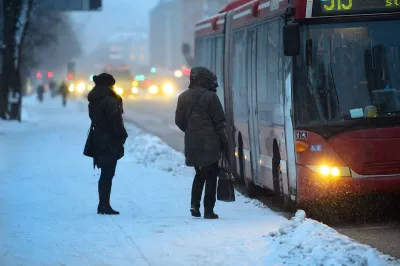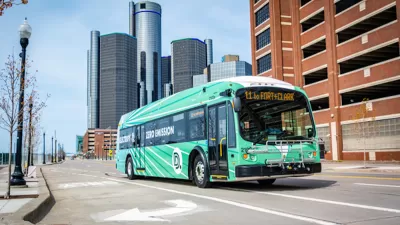Unsurprisingly, people are less likely to use transit during extreme weather events, which are becoming more common around the country.

Extreme weather contributes to a drop in transit ridership, a new study reveals, showing that “America needs to better climate-proof its transit networks and encourage more people to choose shared modes now.”
As Kea Wilson explains in Streetsblog USA, “A recent study of 43 major U.S. transit networks revealed that ridership dropped during long stretches of rain, heat, or other prolonged extreme weather events that scientists link to climate change, at least in the 17 years between when the National Transit Database began collecting stats and 2019, the last year before the pandemic decimated ridership.”
As extreme weather events become more common, this could hinder efforts to encourage transit use and reduce transportation emissions. Weather also impacts transit infrastructure: “During bad snow and rain storms, buses can get snarled in the same traffic as cars, and rail tracks can warp in intense heat, forcing agencies to run trains more slowly or cancel trips outright, leaving even those who would pay the fare with no ride to take.”
Nicole Ngo, lead author on the study, says that transit agencies must significantly expand their efforts to provide shade, cooling greenery, and other climate-controlling measures at bus stops — “and doing so at a vast scale, considering that only about one-fifth of U.S. bus stops even have basic shelters now.”
FULL STORY: How Climate Change Is Hurting Transit Ridership

Planetizen Federal Action Tracker
A weekly monitor of how Trump’s orders and actions are impacting planners and planning in America.

Congressman Proposes Bill to Rename DC Metro “Trump Train”
The Make Autorail Great Again Act would withhold federal funding to the system until the Washington Metropolitan Area Transit Authority (WMATA), rebrands as the Washington Metropolitan Authority for Greater Access (WMAGA).

The Simple Legislative Tool Transforming Vacant Downtowns
In California, Michigan and Georgia, an easy win is bringing dollars — and delight — back to city centers.

The States Losing Rural Delivery Rooms at an Alarming Pace
In some states, as few as 9% of rural hospitals still deliver babies. As a result, rising pre-term births, no adequate pre-term care and harrowing close calls are a growing reality.

The Small South Asian Republic Going all in on EVs
Thanks to one simple policy change less than five years ago, 65% of new cars in this Himalayan country are now electric.

DC Backpedals on Bike Lane Protection, Swaps Barriers for Paint
Citing aesthetic concerns, the city is removing the concrete barriers and flexposts that once separated Arizona Avenue cyclists from motor vehicles.
Urban Design for Planners 1: Software Tools
This six-course series explores essential urban design concepts using open source software and equips planners with the tools they need to participate fully in the urban design process.
Planning for Universal Design
Learn the tools for implementing Universal Design in planning regulations.
Smith Gee Studio
City of Charlotte
City of Camden Redevelopment Agency
City of Astoria
Transportation Research & Education Center (TREC) at Portland State University
US High Speed Rail Association
City of Camden Redevelopment Agency
Municipality of Princeton (NJ)





























